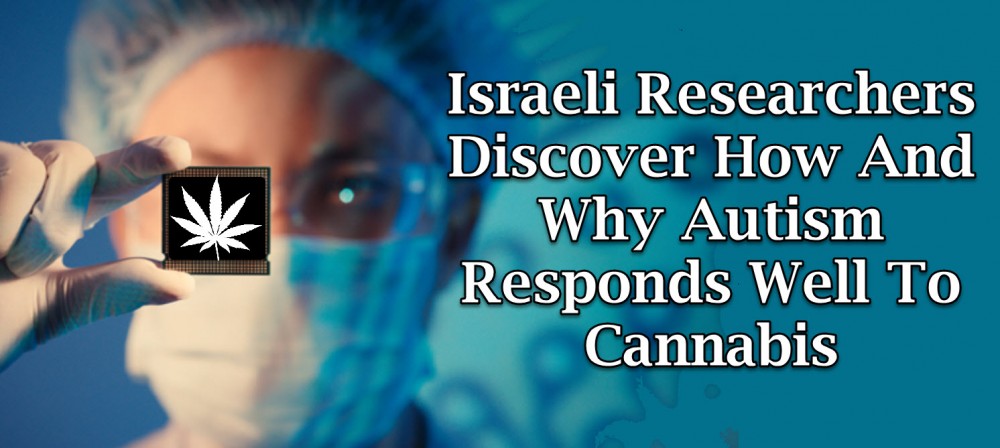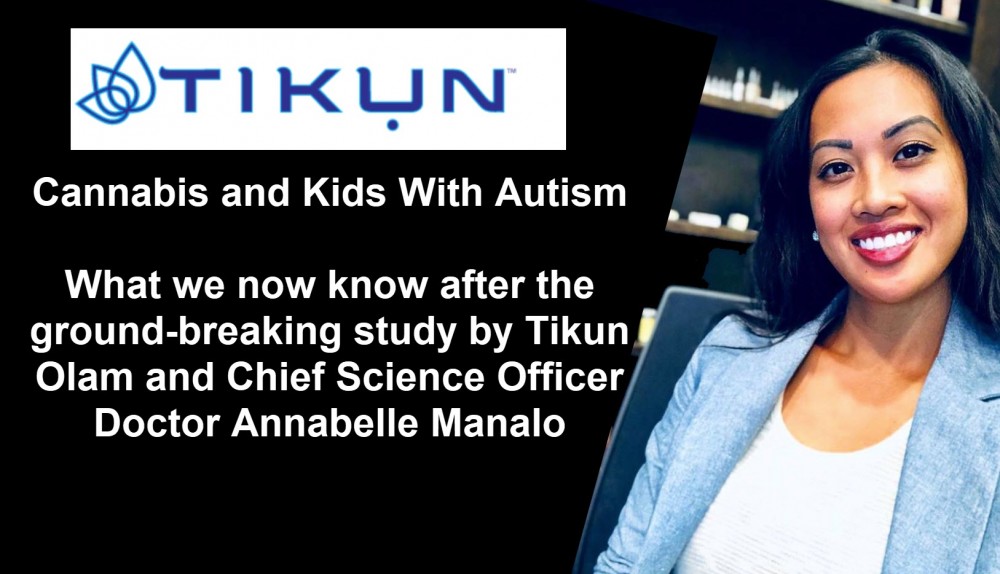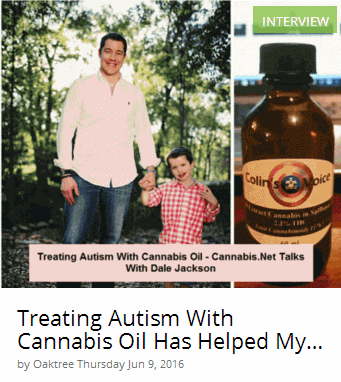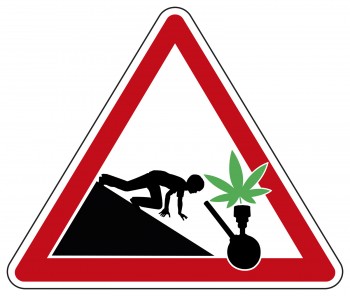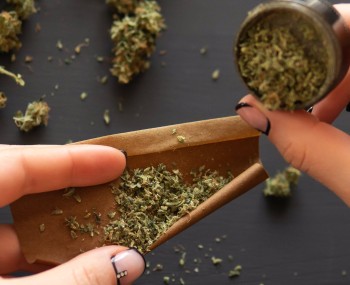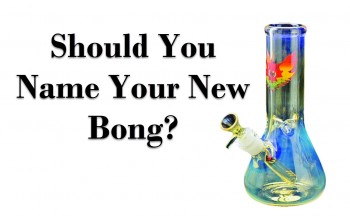My Autistic Son Is In The Israel Cannabis Study...An Interview With Abigail Dar
(Click the video below to listen to the whole interview...)
My Autistic Son is using Cannabis Oil in the Israeli Study from CannabisNet on Vimeo.
00:00 Curt Dalton: Abigail, how are you doing?
00:02 Abigail: Fine thank you. I hope I'll hear you well.
00:07 CD: You're coming through great on this end. This is Curt with Cannabis.net.
00:11 Abigail: Yeah.
00:12 CD: Excellent. And we are obviously recording the call for our readers and our listeners later. And you are a very hot lady in the industry right now and I'm sure a lot of readers and listeners would like to know, super strong response to the autism in Israel testing. We've gotten a lot of great feedback, obviously families that are very much interested for personal reasons. Tell us, just a introduction, tell us who you are and what you're doing with the Israeli autism study.
00:45 Abigail: Okay. First of all, I'm a mother. I'm a mother of a 23-year-old, severely autistic kid, who is not a kid any more. He was diagnosed when he was 16, 18 months old. We've been through all the stages where parents go through with autistic kids, trying to help them, all kinds of therapies, medications, anti-psychotic drugs. He developed epilepsy at the age of 17, and he became self-injurious and violent towards caretakers and me. And we started changing medication, more of this, less of that, all things parents go through with what the mainstream doctors have to offer for them. It didn't work. It didn't work for him, it got worse and worse, he was anxious, he was violent, he was self-injurious, he was suffering. I started reading about cannabis, and in a way, a quite complicated way, I got to some doctor in Israel who agreed to get us the license after appeal because autism is not a qualifying condition in Israel right now. But he is also epileptic and he has these controllable seizures, but some how we got him the card. And from day one we started treating him, it was like a miracle. Like, finally we got something that gave him some tranquility or being able to focus, and sit down and be calm. And I think the most dramatic thing is he started hurting himself and others.
02:47 CD: What age was that at?
02:49 Abigail: What?
02:50 CD: What age was he when that took place?
02:52 Abigail: It was a year ago. He's 23 now, so he was 22 already.
02:57 CD: Okay.
02:58 Abigail: But until he was 22, he was a lot of years medicated with anti-psychotic drugs, which only drove him more and more crazy. This is the way I see it now.
03:12 CD: So that's an interesting point, you originally got the license for your son through epilepsy not through autism 'cause autism didn't qualify.
03:19 Abigail: It's not really epilepsy because the qualifying condition in Israel for epilepsy is untrackable seizures, and you have to go through five anti-epileptic drugs before you get approval for this. Okay?
03:34 CD: Okay.
03:35 Abigail: So it's more like the... I can say it's a complex of him being over 18 and I hate to say it, but it's after appeal like mercy treatment. Like, "Well, you know, he's a lost case, we can give him that. This terrible, terrible thing we don't know enough about. But we tried everything. So, sorry for the word, what the fuck, but we can try this for him." But it's still considered in Israel a last resort. I mean they would give it to epileptic children, to cancer, people who suffer from cancer, to Crohn's disease, but only after they've been through several medications. It's like last resort.
04:24 CD: What was it like to start? I mean, you got the approval, and let's say it's Monday morning, 9 AM, what did you physically do? Did you go to a lab? And was it a small dosage or how did it go?
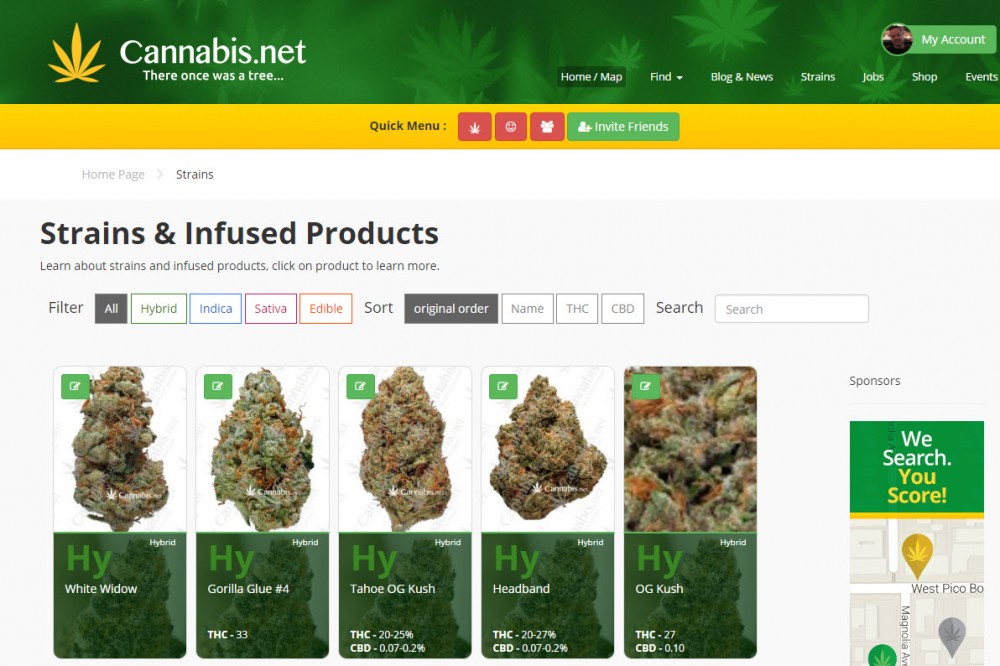
04:34 Abigail: Well, I did a lot of study before, because each country has different growers and different strains and different products. Israel has eight licensed growers at the moment. I did go through trial and error. I did start with whole-plant, high-CBD strain. But we had a few ups and downs until we found the right balance. Like the first strain got him to be... He lost totally his appetite. After that we went through clean CBD, like 98% CBD, no endocannabinoid, which got him bounce of the walls, he was very hyper, very, very anxious. He never became violent and self-injurious for the last year, since he got the cannabis, but we did have our ups and downs. But eventually we found what works for him and we do have the quality of life which we didn't have before. And since I'm activist in many areas in autism people with autism in Israel, like promoting the legislation, their rights, and inclusive solutions in community for many years, I understood that if it works this way for my son, it should be accessible to other kids, that are so easily medicated without having the chance to even try having this thing for their... How do you say... For their well being.
06:18 CD: What is the dosage and how do you deliver it to your son now, presently?
06:23 Abigail: Basically we have oil ointment, Cannabis oil, I give him... He's on high CBD because he's also epileptic, but I must say we don't know enough and some kids needs more THC. He gets something like four to eight drops. I can look at the bottle but we get eight drops three times daily, something like this. So I didn't calculate it, I can calculate it for you later because I know how many milligrams per drop we have. But I found what works exactly for him. But what happened is that I decided, "We gotta have access for our kids." And the way to do it is also to have the proper clinical research, because I believe that a lot of doctors and a lot of people in the mainstream, in the institution, if they have a proper clinical study saying, "Cannabis can help autism." They will be more willing to try and give it to these kids because they need this piece of paper. I think this piece of paper, if pharma and FDA give it to the doctor so they feel like walking on safe ground. Do I make myself clear?
07:41 CD: Yes, yep. I understand. When you say quality of life, what is it like daily right now for you? Are there seizures? What is the quality of life like?
07:53 Abigail: The quality of life is having a son which you are able to take care of him, to drive him in your car, and take him for shopping or therapy without needing a bodyguard with you.
08:10 CD: Yeah.
08:13 Abigail: I think I'm feeling at ease not being bothered about when he's gonna go crazy and hurt himself or others and he's a big guy.
08:24 CD: Okay.
08:25 Abigail: And it was obvious to me that he does it because of anxiety and because he suffers, not because he [08:33] ____ to hurt anybody. He was just suffering.
08:37 CD: Gotcha. Now where does it stand in Israel? You're on the front lines, in Israel itself, how is the lobbying and the work going as of today in the end of 2016, where is Israel at as far as cannabis for autism and other things?
08:55 Abigail: Regarding cannabis?
08:57 CD: Yes.
08:58 Abigail: Well, first of all I think Israel is fairly, very advanced, liberal, and they understand cannabis, is a medicine. So we have quite a vast program, there's about 26,000 people in an 8 million country population who entitle and have access to cannabis in Israel.
09:20 CD: Okay.
09:21 Abigail: We also have 22 clinical research undergoing with cannabis these days. And I think this is the place to do a proper clinical study about cannabis and autism. I'm pretty much in touch with MAMMA, an American organization. You know the MAMMA?
09:41 CD: Yes.
09:42 Abigail: Well, they are lovely mothers, who each one using her own state to advocate for legal access for their kids, with cannabis. And I do believe that if we have a clinical study showing it works for our kids it make it much easier for them to get access for their kids. It's not only about Israel, it's about kids all over. And then I got in touch with professors and with Dr. Adi Eran who's a neurologist, the head of the neuro-pediatric unit in Shaare Zedek, who's already written a research proposal. And I'm working very closely with him, voluntarily because parents in Israel know me as advocate of cannabis, I was on TV, on the radio, whatever. And we started gathering clinical data, like giving kids... About we have over 45 kids who get different strains and different ratios and so once we start the study we will know what is best for them.
10:49 CD: Okay.
10:50 Abigail: But, what bothers me is the funding issue because there are all kinds of forces in the field, and usually business people want to have IP, they want to have revenues, if they give money they want to obviously, to earn something. And not necessarily what they want is what I think is good for our kids, at this stage.
11:18 CD: These pharma... Is this like a pharma issue in Israel as well where big pharma wants...
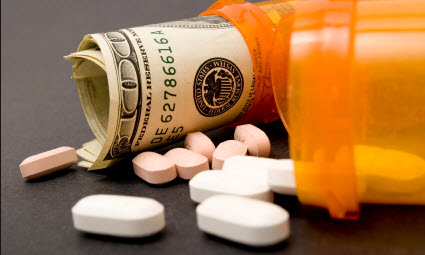
11:24 Abigail: There is, yeah. Some of the growers are in the direction of become more pharma, like isolating what they know right now which is mainly CBD. It's obvious to me that CBD by itself doesn't work for our kids, okay? I'm not sure researchers will agree with me or doctors, but it's quite obvious from my own experience and what I seen with other kids, that when you separate the two molecules, like CBD only or 98%, they don't react as well as to the whole plant. And what bothers me is that wanting to isolate the cannabinoid, comes from the desire sometimes to be able to patent it and have a formula and then FDA, and it's not necessarily what we need right now for our kids.
12:15 CD: That's true.
12:18 Abigail: We have scientifically, 111 cannabinoids known. We keep talking about CBD, THC, and another few because this is what labs, most labs are able to recognize. But there's another 90 there that are doing work and you shouldn't take them out right now. You should wait until we understand better what works for our kids.
12:45 CD: Okay. And then what would be your dream scenario? Does the US going more legal, even at a federal or more states, help you in Israel or what is your... What would you like to see unfold in the US and Israel that's realistic? Does the US matter, how their laws change?
13:07 Abigail: What will be realistic... What I would like is to have more understanding, which comes through proper clinical research, when you do them really, serious lab tests, which I'm collaborating with Professor Dedi Meiri. He has a lab in Israeli Technion and he's able to identify each one of the cannabinoids, not only the five or six most people do. So we want the clinical research be on his data. Like he can examine the strains while we give to the kids. But in order to have some influence, more influence over the study, I figured we need the money. And the money should come from parents or organizations or people who really understand that what matters here is what really works for our kids, not necessarily what brings profit at the moment.
14:00 CD: Okay. And would the US law change promote or give Israel a jump start to funding and changing their restrictive policies or would it be the other way around? Would Israel who's already progressive, change?

14:17 Abigail: Israel is progressive. So in Israel, I guess, I'm not sure... I went with Dr. Adi Eran to the head of the medical cannabis unit in Ministry of Health in Israel and we got... Adi Eran showed his research proposal and I got him some videos of kids before and after treatment, including my son. And he was very attentive. And then they came out with an official announcement that autism will be qualifying condition soon in the medical cannabis Israeli plan. And I assume it's gonna take another few months. There's a sub-committee here sitting for the specifics and once we have gathered the clinical data we're gathering now, they will make it qualifying condition. But I also think a clinical study will help us first understand more, and will be much help for Americans or any medical plans around the world. Because if you come with the papers, scientifically peer reviewed studies saying, "Cannabis, whole plant cannabis, can help autistic kids and adults." It's a breakthrough, that it's never been done before. But if you start giving them isolated CBD or things that not necessarily what a kid needs and the decision doesn't come out of really seeing those kids, then it might go wrong. And this is something I keep saying will happen over my dead body.
[chuckle]
16:00 CD: What is your feeling on recreational use in Israel?
16:03 Abigail: Well, it's not legal in Israel. I don't have a stance, to tell you the truth, I don't have a stance. I was for years, I was anti-cannabis, I never smoked it myself. I even have a case in my family that recreational use got someone into psychosis, so I was really against it all the years. And it's only in the last, I think two years, I started understanding that it's also a medicine. And about recreation now that I see, I'm sure there's less side effects than alcohol. Okay. I'm sure there's a lot of political issues there or financial issues. So I'm sure that the side effects are not as bad as alcohol, but it's not my agenda at the moment. I just want it as a medicine for suffering, autistic kids. And from what I see, my son is older, but I think if you give it to a younger kid, it might even heal some of them. Some of them it gives them the focus or heals the nervous system or something there I don't know to explain, but kids do breakthrough with this plant, and it should be accessible to them.
17:27 CD: Let me ask you and we'd obviously love to help you and get the word out. If I'm a mother or a father, or brother, or sister listening to this somewhere in the world, New Zealand, Europe, the states, Canada and I wanna help you and/or get in touch with you, what would I do first? What should I do?

17:50 Abigail: I have a contact sheet which you can email me and I'll keep in touch with anybody updating regarding the progress of our study, because as long as I'm involved it will be a study that it comes from science and reason. And the other thing, help us fund it. Help us get the funding from the side of the non-business parties of this business. You know what I mean?
18:20 CD: Yeah.
18:21 Abigail: And this is why I'm spending so much effort on this Crowdfunding campaign which will be launched November 15th. So even if each parent will put $30 or $50 in it, we'll have enough money that will be a game changer for us. I know that, I know the forces here.
18:42 CD: I was letting you bring that up; there is a Crowdfunding campaign starting, in a little under a month that obviously you can give as little as, I think it's $5, on Crowd Funder and as much as you'd like for this campaign. And we'll certainly have links to that up for people listening, in the article, we'll have it come up in the video if you're listening or audio as well as in the article, and we'll all be able to contribute. What would be your personal advice to parents right now who are just at their, like you said, at their rope's end, frustrated, looking for hope, what would be a personal message?
19:17 Abigail: First of all don't lose hope. I see the process here which we started and there was a lot of... There's still a stigma against it, but you get to see more and more doctors willing to be open to that. I know personally, Professor Uri Kramer. Uri Kramer is my son's neurologist and he's also one of the leading researchers in epilepsy. They did a paper, actually every time they update it there's a big research going on here. It's not a research, it's a registry. And he told me once that when he started dealing with cannabis for epileptic seizures, he went to a big conference and everybody stayed away from him. And then about a year afterwards, everybody were queuing to shake his hand.
[chuckle]
20:08 Abigail: Serious. So, I think this is what we're going through here. Be patient, but also even if you do get access, you have to understand that cannabis is a very, very complicated plant and not what works for one, works for another. And you have to go through a trial and error with ratios and strains and dosages, until you really get to a point where it helps your kid. But there's no kid it doesn't help, this I'm sure of it. I see those kids, I track, I gather the clinical data, and once you get them the right thing, it works.
20:51 CD: Yes and we've talked to obviously Dale Jackson as well about the difference in oils and how the stigma of "I'm gonna go... Everyone's different and we're gonna go solve everyone's problem with one strain or one oil." Is that misnomer out there, that you just go get this oil like you would buy a Tylenol and that cures everything. And that the different strains and the testing are very important, you're right about that.
21:15 Abigail: It's not only the strains, different strains have different ratios, and we do know that everything is a hybrid, but we know that for autistic kids, they more need, most of them need the Indicia hybrid because it's more calming than Sativa. You need to know a little bit just to start your journey, even if you have access.
21:38 CD: Sure. That was a good tip, actually.
21:40 Abigail: But we learn it, a step at a time.
21:43 CD: And your Crowdfunding program is gonna go live on November 15th on Crowd Funder?
21:48 Abigail: Yeah, I think on Generosity because it's a non-profit platform, 'cause the money will go to a non-profit, Israeli non-profit I'm involved in. But all the money raised will go to the research which we parents can have a say in what is given there to our kids.
22:12 CD: Excellent. Well, we look forward to promoting that, and I certainly appreciate your time, you're on the other side of the world from me, but this is such an important message and your passion for your treatment of your son, I'm sure will affect people listening and people reading and they'll wanna contribute. So hopefully, as we have a few weeks left we can get the word out and get people to understand that the treatment that are being tested and that there is hope, like you said, don't give hope and that one day [22:40] ____.
22:40 Abigail: No, there is hope, but we are still in the beginning of the journey. Even maybe one day we understand better what works for our kids, but for now to isolate cannabinoids and go for pharma or patents will be devastating for them. We just don't know enough to do that right now. It's not even about... I'm okay if somebody wants to make money, just not on the back of our kids, I'm sorry.
23:08 CD: No, I don't think you need to apologize. I'm pretty sure no one out there, including a parent with or without someone with a child with epilepsy or autism would agree with that. So I appreciate the time. Thank you for joining us at Cannabis.net we will be happy to promote and do anything we can to help your research. And hopefully you'll be hearing from our listeners and our readers with questions and we'll get your contact information up on the article as well.
23:36 Abigail: I'll be very happy.
23:37 CD: Thank you very much.
23:37 Abigail: Thank you very much.
23:38 CD: Alright.
23:40 Abigail: Bye.
SIGN UP TO HELP ABIGAIL AND GET HER UPDATES, CLICK HERE.
Are you on a laptop or using the Slideshare app? You can listen to our whole interview with Abigail by clicking the video player below, as well as the YouTube video at the top of the page.
OTHER STORIES THAT MAY INTEREST YOU...
ISRAELI DISCOVERS THE LINK BETWEEN CANNABIS AND AUTISM, CLICK HERE.
OR..
THE LARGEST STUDY ON CANNABIS AND AUTISM EVER, CLICK HERE.
OR..
TREATING AUTISM WITH CANNABIS OIL HAS HEPLED MY SON..CLICK HERE..
OR...
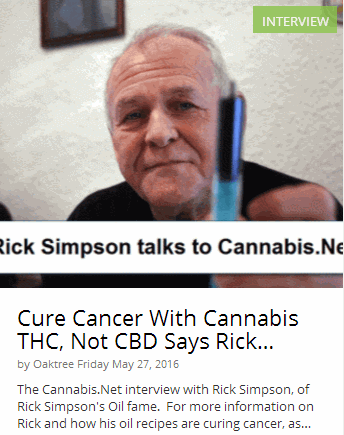
CURE CANCER WITH CANNABIS HIGH IN THC, RICK SIMPSON SAYS, CLICK HERE.
Can you give $5 to the help the funding research on
autsim and cannabis, click here!
